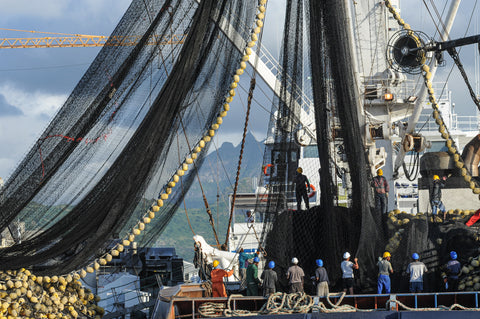We’re told we need to care more about the ocean, but why?
The ocean is an amazing place. It covers over 70% of the world’s surface and holds around 96.5% of the world's water. There are rivers, lakes and mountains beneath the surface, it covers more than two thirds of the world, we’ve only explored about 5% of it and an amazing 94% of the Earth's life is aquatic.
In the last few years the environment has rightfully become an important topic in the yachting industry and “sustainability” has become the buzzword. Understandably ocean health has become the focus and lots of marine companies have started offering more environmentally friendly solutions while the boating media has started telling us we need to care more about the ocean. But this got us thinking; why are we doing this? We’re being told all the time we need to care about the ocean’s health but we don’t always stop to think why. We thought we’d take a brief look into why to remind ourselves on those hard days why we need to care.

As the world focuses on trying to agree on a way of reducing global warming by reducing the amount of CO2 in the atmosphere, it’s worth noting that ocean plants are great at absorbing CO2 from the air and absorb around 31% percent of what humans create when we burn fossil fuels. In fact the North Sea seabed stores 100 million tonnes of carbon alone with a 10cm layer contains the equivalent of 20% of the carbon stored in Britain’s forests according to an article in The Times. Another article in The Guardian reported a study published in Nature found that bottom trawling by fishing boats releases as much carbon as air travel. Only 7% of the world’s oceans are under any kind of protection to control this.
What’s more, between 70 to 80% of the world's oxygen comes from marine plants, mostly marine algae. While we hear much on protecting the forests and rainforests of the world, this will all be pointless if we allow the deterioration of the ocean. It’s thus critical that we protect ocean plant life too. Protecting the ocean is as, if not more important, to the very survival of the human species as protecting trees on land.
The ocean has already helped to slow down the pace of global warming by reducing the accumulation of atmospheric CO2. However this is coming at a cost to itself, namely in the form of ocean acidification which is having negative effects on marine life. A study in Nature Climate Change found that ocean acidification is also likely to cause many species of phytoplankton, which are also partly responsible for absorbing carbon in the atmosphere, to die out.
Several studies have also found paint and antifoul paint are also being found to affect sea life when leaching from the hulls of boats in the water or when being scrapped or washed off in marinas. One such study published in Environmental Pollution involving scientists from Plymouth Marine Laboratory, the University of Plymouth and PML Applications Ltd., observed decreases in weight and feeding rate in ragworms when exposed to the modern biocidal treatment and a 100% mortality rate in cockles when exposed to the modern biocidal treatment.
The study also found that the non-biocidal, silicone-based paint particles, although generally less toxic, still produced sub-lethal responses such as weight loss in cockles. It concluded, such an impact could have severe implications for ecosystems over a natural time scale.
Furthemore plastics released into the ocean are affecting marine life, not just in larger mammals such as the beached whales found to have toothbrushes, plastic bags and more in their stomachs but more insidiously in the form of plastic broken down into microplastics. Microplastics enter into the food chain when eaten by smaller fish, which are then eaten by larger fish which are then eaten by humans. By the time the fish reach our plates, the number of microplastics in the food chain have concentrated in larger numbers. These microplastics are not just harming the fish but humans too.
As delicate as ecosystems are, any changes over time could lead to impact on the oceans ability to absorb carbon dioxide in the atmosphere and/ or produce oxygen. We need to look after the ocean so it can continue to look after us, not just as a source of food but literally to help us breathe and to help reduce global warming. To us that’s a pretty big incentive to keep doing what we’re doing and to continue to look after the ocean.
You can read our article on Coronavirus Highlighted Why We Should Care More About Our Oceans.
